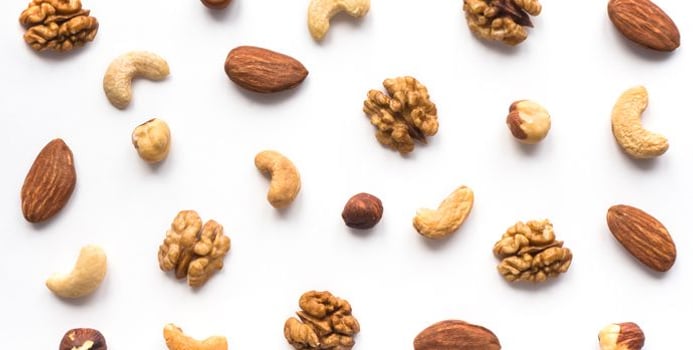Results of a new study of Americans and Canadians found that those who consumed most of their protein from nuts and seeds had a lower risk of heart disease than those who ate mostly meat. This study demonstrates that the type of protein (plant versus red meat) significantly affects your heart disease risk.
For many decades now, there has been a plethora of research that focused on the type of dietary fat and its effect on cardiovascular disease risk, but these new findings reveal that the type of dietary protein may also play a role in your risk as well.
The Study
Scientists at AgroParisTech, in conjunction with the Institute of National Agronomic Research in Paris and Loma Linda University School in California, discovered that the source of protein made an enormous difference in the risk of developing heart disease. Red meat increases the risk of heart disease by 60 percent but plant proteins such as nuts and seeds decrease the risk of heart disease by 40 percent. The results of this study were published in the International Journal of Epidemiology in April of 2018.
Dietary patterns of 81,337 women and men who participated in the Adventist Health Study-2 were analyzed using a validated food frequency questionnaire. The study participants ranged in age from 25 to 44 years of age. Seventh-day Adventists were studied because about half of them are vegetarians while the other half eat meat, making this population a suitable group to study.
Nuts not only provide protein, they also give you heart-healthy fats, vitamins, trace minerals such as zinc, magnesium, copper, and selenium, phytochemicals (illness-fighting plant compounds, including flavonoids, phenolic compounds, ellagic acid, luteolin, tocotrienols, and isoflavones) and plant sterols, which may help decrease your cholesterol levels and cut cancer risk.
How to Swap Out Meat for Nuts and Seeds
Go Nutty with Your Salads
Rather than relying on the familiar standby of grilled chicken or sliced turkey on top of your salad, toss on a handful of your favorite nuts or seeds for protein. To really enhance their flavor, toast nuts in a skillet or roast them in the oven until toasted and fragrant.
Try a Pesto Sauce for Pizza or Pasta
Rather than using a traditional tomato-based pizza or pasta sauce, opt for heart-healthy pesto instead. Pesto, generally made from pureed pine nuts, olive oil, fresh basil, garlic, and grated Parmesan or Pecorino cheese, is loaded with plant-proteins and healthy fats to keep you satisfied. Most importantly — it's insanely delicious.
Use Nut Butters in Your Sauces
Thai-based peanut sauce is wonderfully delicious with pasta, brown rice, or vegetable stir-fry dishes. It also makes a great marinade for tofu.
Swap Beef Jerky for Nuts
Rather than packing beef jerky (or other any other meat jerky) as your go-to, shelf-stable snack for hikes, lengthy road trips, or sporting events, tote a couple reusable plastic bags filled with various nuts or seeds for when hunger strikes.
Good Ol’ PB & J Sandwich
Skip the burger or roast beef sandwich and opt for a quick, simple, comforting peanut butter sandwich instead. Be sure to spread natural peanut butter (or other nut butter, such as almond butter or macadamia nut butter) on whole-grain bread. Choose nut butters without added sugar and use just a small amount of jelly or select no sugar added jelly to keep the sugar content low.
Add Nuts and Seeds to Foods You Already Enjoy
Toss toasted nuts or seeds into your favorite breads, muffins, pancakes, whole-grain pilafs, hot and cold cereals, yogurt, ice cream, soups, salads, casseroles, and chilis.
Don’t Go Against the Grain
While meats are complete proteins on their own — meaning they contain all the essential amino acids on their own in sufficient quantities — nuts and seeds are not. However, the amino acids found in grains complement the amino acids in nuts and seeds, so including both in your diet will ensure you get the full spectrum of essential amino acids. You do not need to eat them in the same meal, just be sure to include a wide variety of plant-based foods throughout the day.
[Image via Shutterstock]



